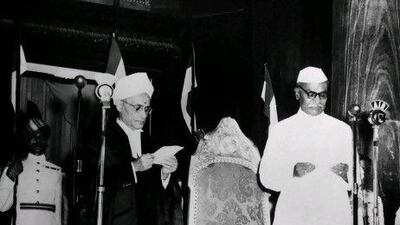When Pranab Mukherjee is sworn in today as India's 13th president, he will take part in an inauguration ceremony that can be traced to its roots in 1950 and a crisp January day when Rajendra Prasad became the first president of India.
Prasad, a teacher and lawyer, had just presided over the assembly that drafted India's constitution. His swearing in, on January 26, marked not only the official adoption of the constitution but also India's transition into a republic.
When Prasad wrote to Jawaharlal Nehru, the prime minister, consulting him about what he should wear for the ceremony, Nehru wrote back immediately, although he received the letter a little after midnight.
"I do not think it would be proper for us to adopt any distinctive badges, overnight as it were, without careful consideration," Nehru wrote. He suggested a "rather simple formal dress … a black achkan [tunic] and white churidar pyjamas".
The next day, in reply to a draft of a speech sent by Prasad, Nehru suggested "only one small correction" - a deletion of the word "immediate" - in a sentence that read: "The present demands even greater devotion and sacrifice than the immediate past."
Before the swearing-in, Prasad visited Raj Ghat, a memorial to Mahatma Gandhi - as every president since him has done, and as Mr Mukherjee will do today.
That first inauguration took place in New Delhi's Government House - as Rashtrapati Bhavan, the president's official residence, was then known.
In front of nearly 500 guests - including Sukarno, the president of Indonesia - Prasad took the oath administered by India's chief justice.
One sentence from Prasad's speech, made in both Hindi and English, is frequently quoted: "Today, for the first time in our long and chequered history, we find the whole of this vast land, from Kashmir in the north to Cape Comorin in the south, from Kathiawad and Cutch in the west to Coconada and Kamrup in the east, brought together under the jurisdiction of one constitution and one union."
Subsequent swearing-in ceremonies have shifted to the Central Hall of Parliament House, which accommodates more guests and also symbolically brings the president closer to the heart of Indian democracy.
In The Hindu newspaper on Monday, Gopalkrishna Gandhi, a former governor of West Bengal and considered by many to be a possible presidential candidate, called for the ceremony to be moved again, from Parliament House to New Delhi's Old Fort or Red Fort, to be "nearer the people".
As it stands now, the inauguration ceremony was too remote from India's masses, Mr Gandhi wrote. "India deserves a presidential inaugural where the bugle sounds but the spoken word echoes as well. Where, if hands clap in rhythmic unison, hearts miss a beat or two as well," he said.
Today Mr Mukherjee and his predecessor, Pratibha Patil, will proceed from Rashtrapati Bhavan to Parliament House.
After taking the oath and being accorded a 21-gun salute, Mr Mukherjee is due to address ministers and other dignitaries, before going back to Rashtrapati Bhavan with Ms Patil.
Later in the day, he will formally escort Ms Patil to her new home in central Delhi, completing the process of the presidential transition and leaving him the official resident of Rashtrapati Bhavan.
Abdul Mannan, the chairman of the media committee for the West Bengal Pradesh Congress Committee, said that more than 500 Congress party workers had arrived in Delhi over the last few days, hoping to witness the inauguration of the first Bengali president of India.
Bongo Bhavan, the New Delhi guesthouse for government officials from West Bengal, "has no more space left", said Mr Mannan from Kolkata. "They are staying in hotels."
He added: "I don't know how many people will be allowed into the ceremony, but everyone has gone hoping for an invitation. We are very proud. He [Mr Mukherjee] may have made his mark in politics in Delhi, but he distinguished himself here first."
On Sunday, when the results of the presidential election were announced, people on the streets of Kolkata celebrated.
"There has been singing, dancing, fireworks, and of course the distribution of sweets," Mr Mannan said.
In Mirati, Mr Mukherjee's home village, banners proclaiming "Amder Gorbo Pranab Babu" (Pranab Babu is our pride) were strung up outside his ancestral house.
Mr Mukherjee's sister, Annapurna Banerjee, said that, many years ago, she and he brother had seen the horses of the president, and Mr Mukherjee had remarked that he would like to come back, in another life, as a presidential horse. "They don't have to work, they just eat, and look at their shining coats," Ms Banerjee remembered him saying. She replied: "Why become a rashtrapati's [president's] horse? You will in this life become a rashtrapati."
Follow
The National
on
& Surya Bhattacharya on
ssubramanian@thenational.ae
Follow
The National
on
& Samanth Subramanian on

